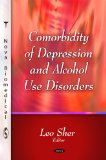Comorbidity of Depression and Alcohol Use Disorders

Major depression affects approximately 10 million Americans or roughly 5% of the population and is the leading cause of disability in the United States. Similarly, alcohol problems, including at-risk drinking, alcohol abuse, and alcohol dependence, are highly prevalent. Patients with depression frequently have alcohol problems. Alcohol problems in depressed patients present diagnostic and management challenges and may adversely affect the course of depression and its response to standard therapies. It is important to understand the psychobiology of the comorbidity of depression and alcohol use disorders and to develop new treatment modalities for patients with this comorbidity. This book will contribute to this goal. The contributors to this book are the best international experts in the field of the comorbidity of depression and alcohol use disorders. This important book will be of interest to physicians, psychologists, mental health counselors, other clinicians, medical and psychology students, and medical residents.
Publisher: Nova Science Publishers.
Editor: Leo Sher, M.D.
Table of Contents:
Preface
Chapter 1. The epidemiology of major depression and alcohol dependence.
(JianLi Wang, Shawn Currie, Departments of Psychiatry and of Community Health Sciences, Faculty of Medicine, Univ. of Calgary, Calgary, Alberta, Canada
Chapter 2. The relationship between depression, alcohol use disorder and coping motives for drinking among Canadian men and women.
(Agnes Massak, Kathryn Graham, Centre for Addiction and Mental Health & Department of Psychology, Univ. of Western Ontario, London, Ontario, Canada; National Drug Research Institute, Curtin Univ. of Technology, Perth, Western Australia
Chapter 3. The alcohol-depression-hypothesis: gender and the prevalence of depression among Jews.
Kate M. Loewenthal, Royal Holloway, Univ. of London, London, UK
Chapter 4. Addressing alcohol use among depressed patients.
(Susan E. Ramsey, Patricia A. Engler. Rhode Island Hospital & Brown Medical School, Providence, RI, USA)
Chapter 5. Treatment of comorbid depression and alcohol abuse/dependence with antidepressant medications.
(Thomas Paparrigopoulos, Eleftherios Mellos, Ioannis Liappas. Athens Univ. Medical School, 1st Dept. of Psychiatry, Eginition Hospital, Athens, Greece)
Chapter 6. Alcohol misuse and seasonal changes in mood and behavior.
Leo Sher, Dept.of Psychiatry, Columbia Univ., New York, New York, USA.
Chapter 7. Adolescence: the emergence of alcohol use and depressive disorders.
(Ty S. Schepis, Uma Rao; Dept. of Psychiatry, Yale Univ. School of Medicine, New Haven, CT., USA; Dept. of Psychiatry, The Univ. of Texas Southwestern Medical Center at Dallas, Dallas, TX, USA)
Chapter 8. Clinical features of comorbid depression and alcohol abuse in adolescents.
(Debora Ganz, Leo Sher; Dept. of Psychiatry, Columbia Univ. New York, NY, USA
Chapter 9. Parental influences on internalizing and externalizing pathways to alcohol use and alcohol related problems.
(Julie A. Patock-Peckham, Mallary Kleeschulte; Missouri Univ. of Science & Technology, Rolla, MO, USA)
Chapter 10. The consequences of parental alcohol abuse for psychiatric problems in adolescence.
(Sirkka Peiponen, Private Psychiatric Practice, Kuopio, Finland)
Chapter 11. The relationship between insecure attachment and deficits in the ability to cope with stress: Attachment theory as a framework for understanding the etiology of suicidal behavior and alcohol use disorders.
(Elizabeth D. Stroscio, Leo Sher, Dept. of Psychiatry, Jamaica Hospital Medical Center, Jamaica, NY, USA;
Chapter 12. Neuropathology of depression, alcoholism, and their comorbidity in the human prefrontal cortex.
(Jose Javier Miguel-Hidalgo, Dept. of Psychiatry and Human Behavior, Univ. of Mississippi Medical Center, Jackson, MI, USA)
Index
